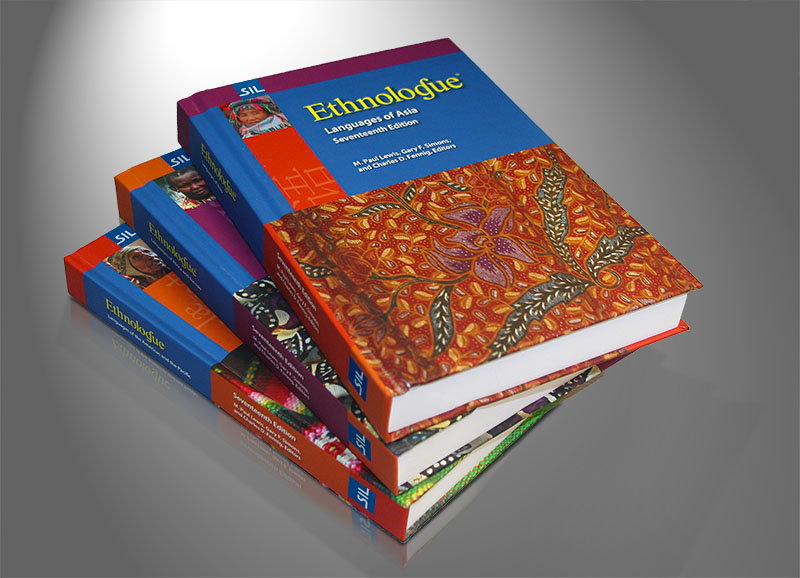Ethnologue in print and for download
 We're happy to announce that the Ethnologue, 17th edition, is now available in print. Long time users of the Ethnologue will remember the various formats the print edition has taken over the years, from the earliest mimeographed list of languages needing Bible translations to an ever-more-comprehensive catalog of all of the languages of the world in one, two or three volumes at different times. The 17th edition print edition consists of three completely self-contained volumes each focused on approximately one third of the languages of the world by Ethnologue "area." One volume covers Africa and Europe, another, the Americas and the Pacific, and the third, Asia. Each volume contains statistical tables, indexes, and maps specific to that volume, The introduction is repeated in full in each book and serves as an important guide to the reader explaining how we have organized the data, defining the labels and categories that we use and giving a general overview of the many issues arise in this effort to catalog all the living languages of the world.
We're happy to announce that the Ethnologue, 17th edition, is now available in print. Long time users of the Ethnologue will remember the various formats the print edition has taken over the years, from the earliest mimeographed list of languages needing Bible translations to an ever-more-comprehensive catalog of all of the languages of the world in one, two or three volumes at different times. The 17th edition print edition consists of three completely self-contained volumes each focused on approximately one third of the languages of the world by Ethnologue "area." One volume covers Africa and Europe, another, the Americas and the Pacific, and the third, Asia. Each volume contains statistical tables, indexes, and maps specific to that volume, The introduction is repeated in full in each book and serves as an important guide to the reader explaining how we have organized the data, defining the labels and categories that we use and giving a general overview of the many issues arise in this effort to catalog all the living languages of the world.
With the 17th edition, we made this website the primary channel for making the Ethnologue information available, without cost. The print volumes are not free though they are modestly priced for their size and considerable content. This is also the debut of print-on-demand publishing for us and begins a new era of flexibility and efficiency that we hope will be a Good Thing. As a result of that change, the books cannot be purchased directly from the Ethnologue office nor from SIL International as in the past. Rather, they are available for purchase through your preferred bookseller (e.g., Amazon, Barnes and Noble to name just two). The print versions provide a snapshot of the online data but also contain additional summary information that is not available on the website and we think that makes it worth getting hold of the volume or volumes that are most useful to you.
As I've mentioned before, we are now updating the online edition annually. Our strategy is to focus our research on one-third of the languages of the world each year, corresponding to the organization of the print volumes, and rotate sequentially through the three focus areas. While we may be intensively updating the languages of a different part of the world (Africa and Europe, Americas and Pacific, Asia) in successive years, we also publish any other updates or corrections, from any part of the world, in the next scheduled edition. So each new online edition contains the latest and best information that we can provide. By using print-on-demand technology, we are able to update the print editions annually as well (Librarians, take note!). As we work out the bugs and gain experience with the technology we expect that the print versions of future editions will be available very shortly after the website is updated.
I have also mentioned previously that Ethnologue country reports are available for purchase from this website. The country reports are downloadable PDF documents with working internal hyperlinks. These handy reports include full indexes (including in most cases, an index of languages by state/province within the country), statistical summary tables, and maps. These also contain some representations of the data that are not available online. Though we expect many researchers will find one or more of the print volumes to be useful, for some, home schoolers or classroom teachers, for example, a country report may be just the resource you need. They are inexpensive and easy to download. We have a sample report available so you can see the way the reports are organized and what they include.
We hope these additional resources will serve you well and we invite your comments and suggestions. The best way to make comments and propose corrections is to become a registered member of the Ethnologue community and post your feedback on the specific country or language page. You can also comment on this blog post or you can use the general contact form for more general comments or to address an issue not related to a particular country or language.
